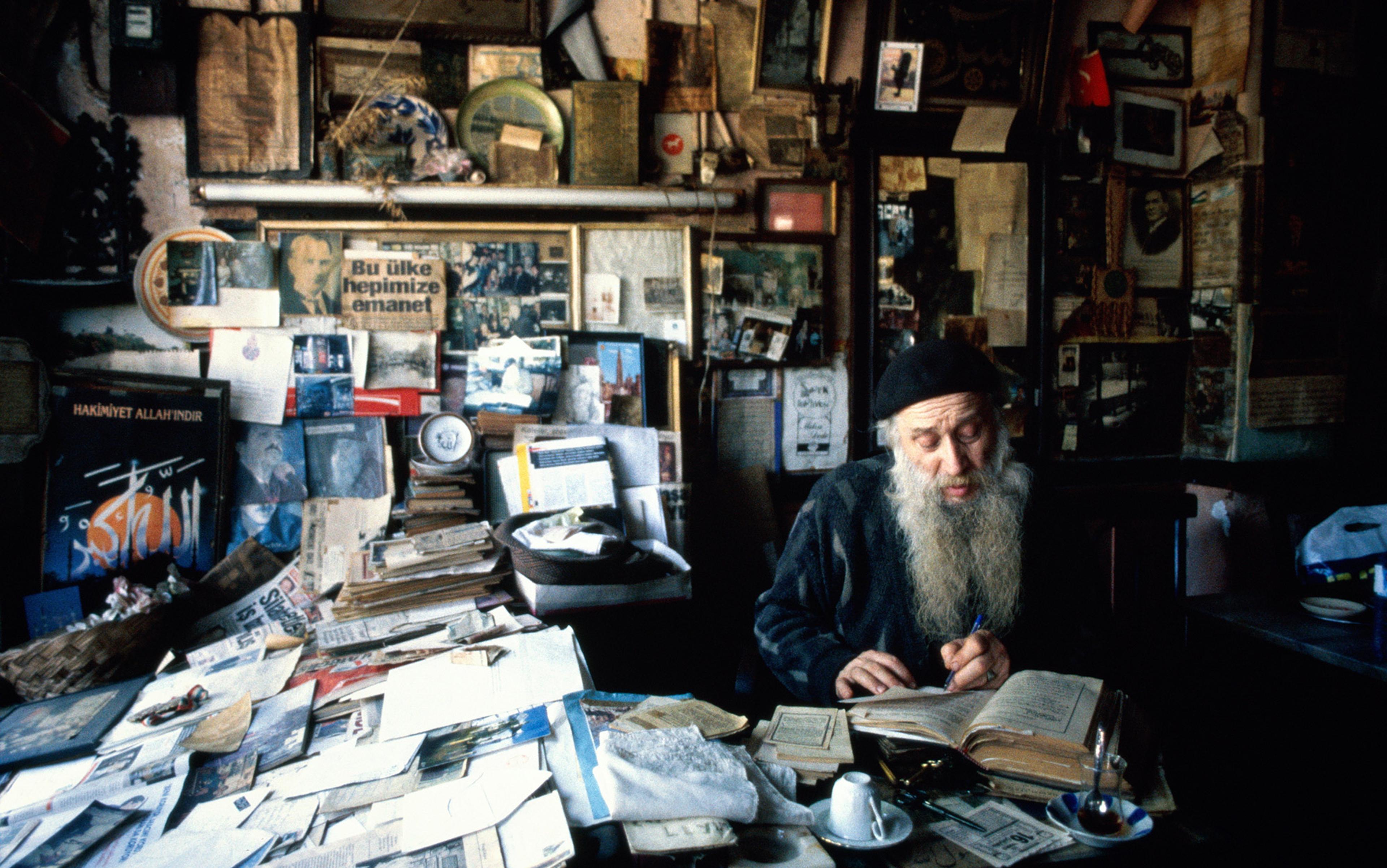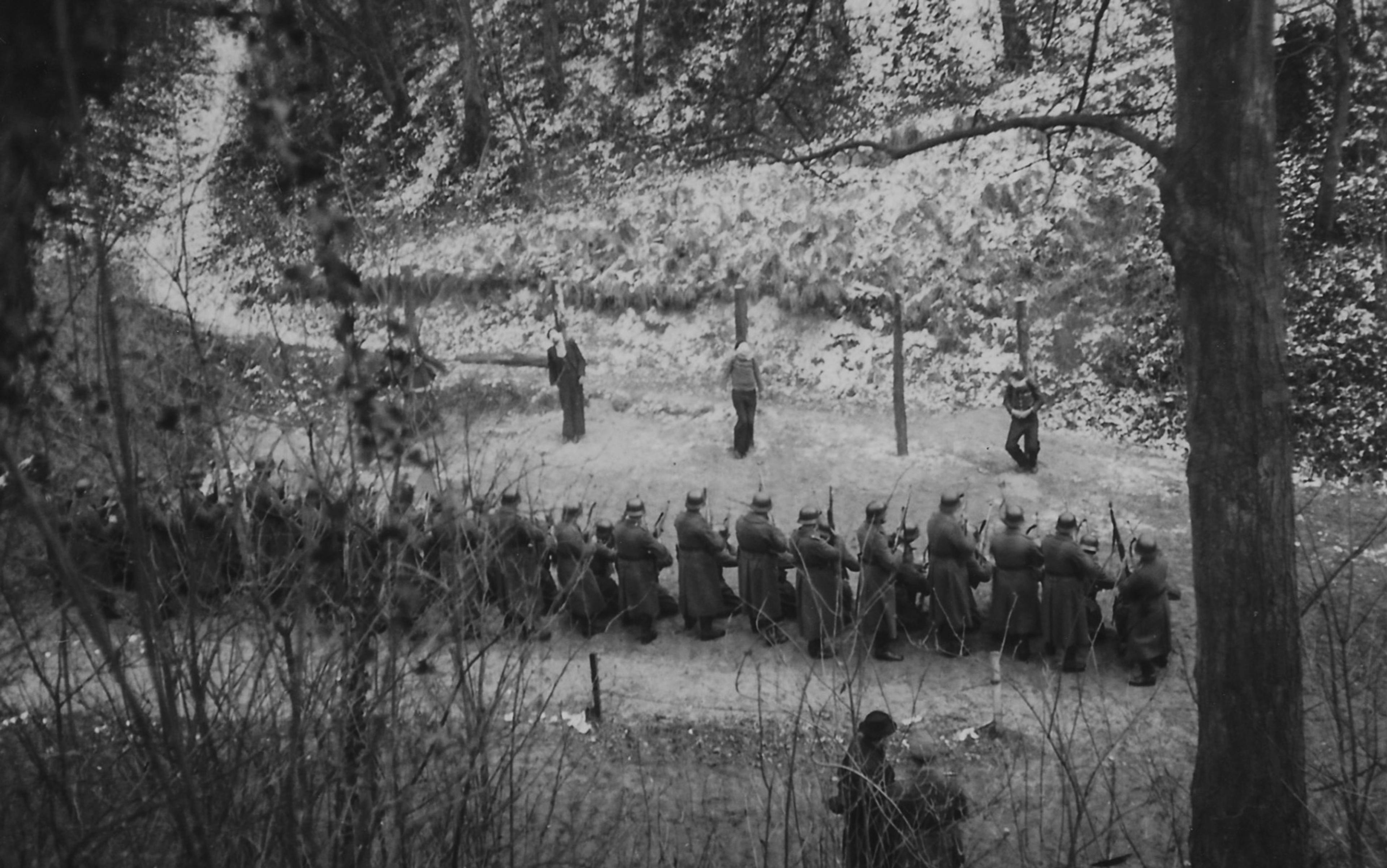On the afternoon of 31 January 1827, a new vision of literature was born. On that day, Johann Peter Eckermann, faithful secretary to Johann Wolfgang von Goethe, went over to his master’s house, as he had done hundreds of times in the past three and a half years. Goethe reported that he had been reading Chinese Courtship (1824), a Chinese novel. ‘Really? That must have been rather strange!’ Eckermann exclaimed. ‘No, much less so than one thinks,’ Goethe replied.
A surprised Eckermann ventured that this Chinese novel must be exceptional. Wrong again. The master’s voice was stern: ‘Nothing could be further from the truth. The Chinese have thousands of them, and had them when our ancestors were still living in the trees.’ Then Goethe reached for the term that stunned his secretary: ‘The era of world literature is at hand, and everyone must contribute to accelerating it.’ World literature – the idea of world literature – was born out of this conversation in Weimar, a provincial German town of 7,000 people.
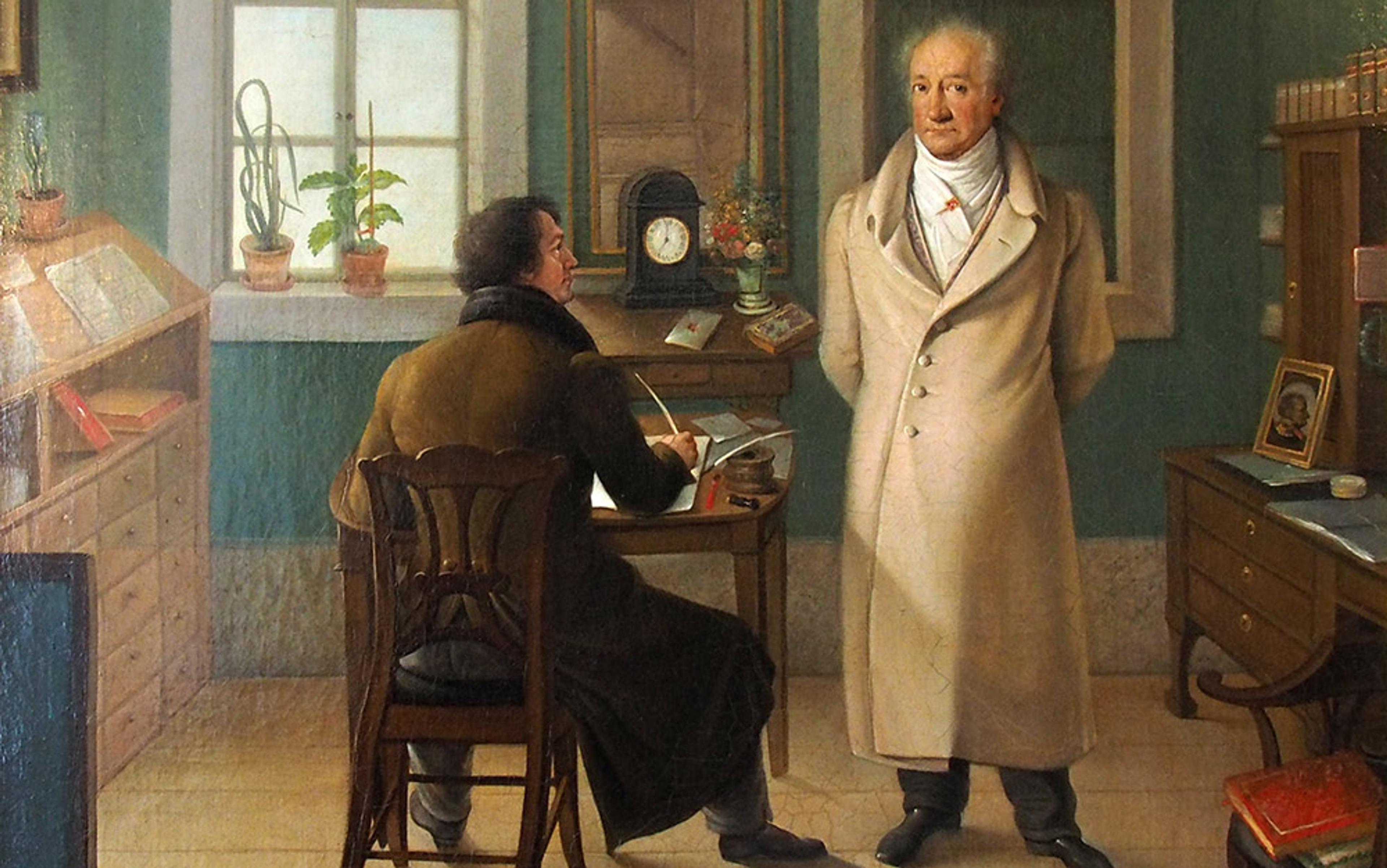
Detail from Goethe, dictating to his scribe (1831) by Johann Joseph Schmeller. Photo courtesy Wikipedia
Like the rest of Europe, Weimar fell under the cultural shadow of Paris. The city exported its metropolitan culture, making Europeans read French novels, recite French poetry and watch French plays. Many German artists and intellectuals responded to Paris’s cultural domination with a nationalist initiative. They collected folk tales and other components of popular and peasant pastime, valorising an entity called German culture. Indeed, they helped to make the essentially German idea of culture – as opposed to the Anglo ‘society’ or the French ‘civilisation’ – the foundation for a future nation state.
Goethe himself had been educated in the French manner. He agreed with German nationalists that cultural dependence on France must end. But he disagreed with their search for native German culture and folk traditions. Goethe searched for an alternative to both metropolitan culture and German nationalism. First, he turned to England, especially William Shakespeare, but soon realised that Anglo cultural dominance was no improvement. He needed something not just different, but bigger and better. The solution was world literature.
World literature originated as a solution to the dilemma Goethe faced as a provincial intellectual caught between metropolitan domination and nativist nationalism. In addition to Chinese novels, he had been reading the classical Sanskrit play Shakuntala by Kalidasa; he had studied Arabic; and he had fallen for the medieval Persian poet Hafez. All around him, his associates were dismissive of these interests. On his birthday, they gave Goethe a turban. Such pranks left Goethe undaunted. He persevered with his far-flung reading habits, hoping that others would follow his example. For Goethe, world literature represented the bold ideal of a world in which no single language or nation dominated. World literature was the cultural expression of a political order, one in which the world had moved beyond the nationalism and colonialism that were dominating the 19th century.
Goethe knew he would have to convert his contemporaries to the ideal of world literature. He also knew that he had a powerful ally: the reality of an emerging world market, including in literature. The availability of works from distant places, a relatively new phenomenon, was what had made possible the idea of world literature in the first place. This world market, as he saw it, gave a particular role to Germany: ‘Whoever knows and studies German, inhabits the marketplace where all nations offer their products; he plays the translator even as he reaps profits.’ Through translation, German publishers and writers could profit from cultural difference, bringing literature from distant lands to the beautiful Duchess Anna Amalia Library in Weimar, where Goethe liked to work.
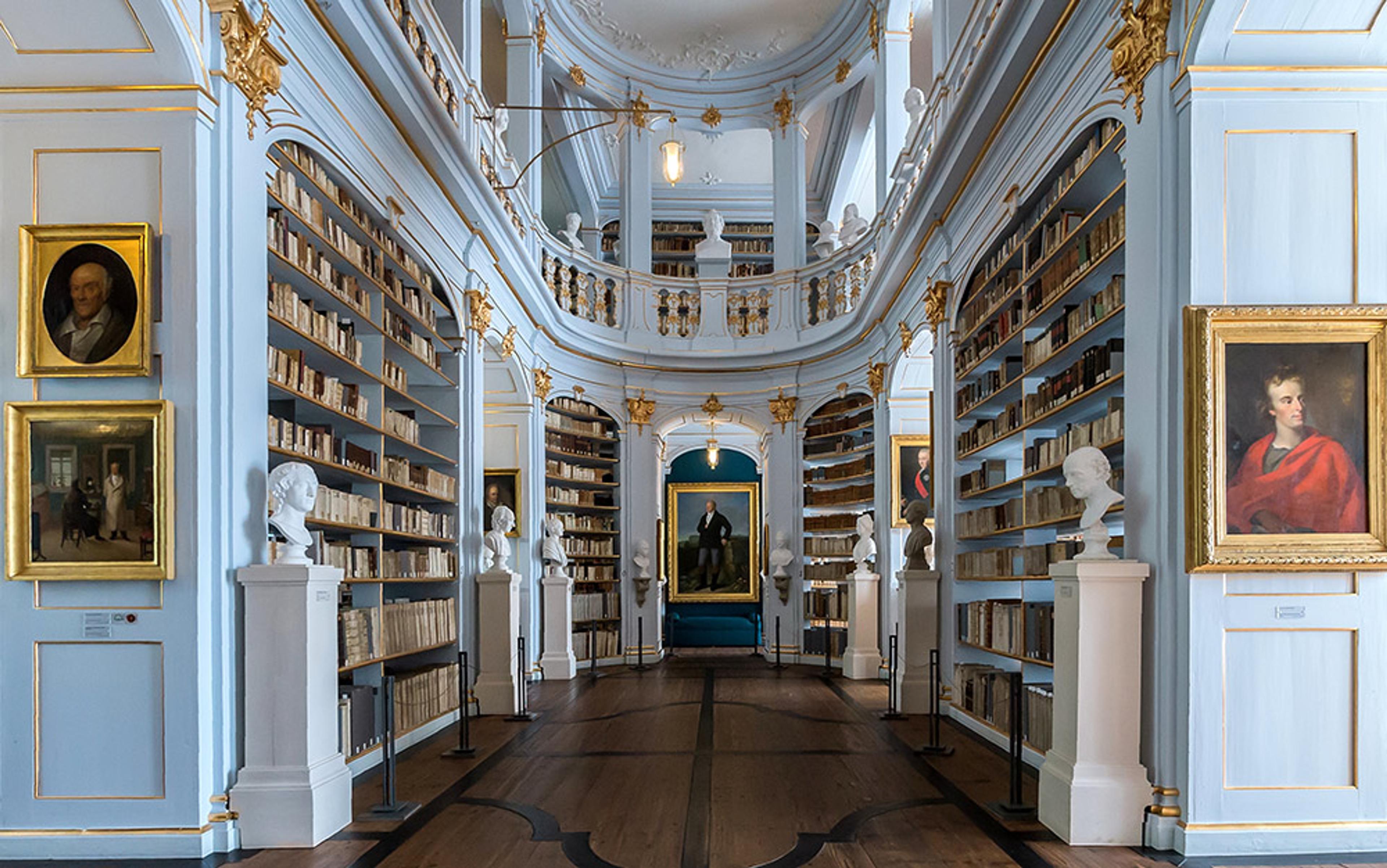
Rococo Hall of Duchess Anna Amalia Library, Weimar. Photo courtesy Wikipedia
Goethe’s insight that the formation of a world market had laid the foundations for world literature captured the imaginations of Friedrich Engels and Karl Marx. Engels, the son of a rich industrialist, had gone to Manchester to study advanced methods of industrialisation. Marx had gone to Berlin to immerse himself in philosophy. The two began to collaborate, bringing together Engels’s economic studies of industrialisation and Marx’s philosophical ideas. When asked to formulate a new programme for an obscure group of radicals in London, Marx and Engels wrote The Communist Manifesto (1848).
In a stunning paragraph from that text, the two authors celebrated the bourgeoisie for their role in sweeping away century-old feudal structures:
By exploiting the world market, the bourgeoisie has made production and consumption a cosmopolitan affair. To the annoyance of its enemies, it has drawn from under the feet of industry the national ground on which it stood. … These industries no longer use local materials but raw materials drawn from the remotest zones, and its products are consumed not only at home, but in every quarter of the globe. … In place of the old local and national seclusion and self-sufficiency, we have commerce in every direction, universal interdependence of nationals. And as in material so also in intellectual production. The intellectual creations of individual nations become common property. National one-sidedness and narrow-mindedness become increasingly impossible, and from the numerous national and local literatures there arises a world literature.
World literature. To many contemporaries, it would have sounded like a strange term to use in the context of mines, steam engines and railways. Goethe would not have been surprised. Despite his aristocratic leanings, he knew that a new form of world market had made world literature possible.
The Communist Manifesto aspired to be a model of world literature
Marx and Engels described the world market as a result of European trade empires and colonialism. European (Portuguese, French, English) colonial officers had translated the Chinese, Arab and Persian literature that Goethe was reading in Weimar. Working with local elites and scholars from what Marx and Engels described, in the Manifesto, as ‘the remotest zones’, these colonial officials had produced the editions and translations of literature now reaching ‘every quarter of the globe’. Thanks to advanced printing machines, even the production of literature resembled the industry of Manchester.
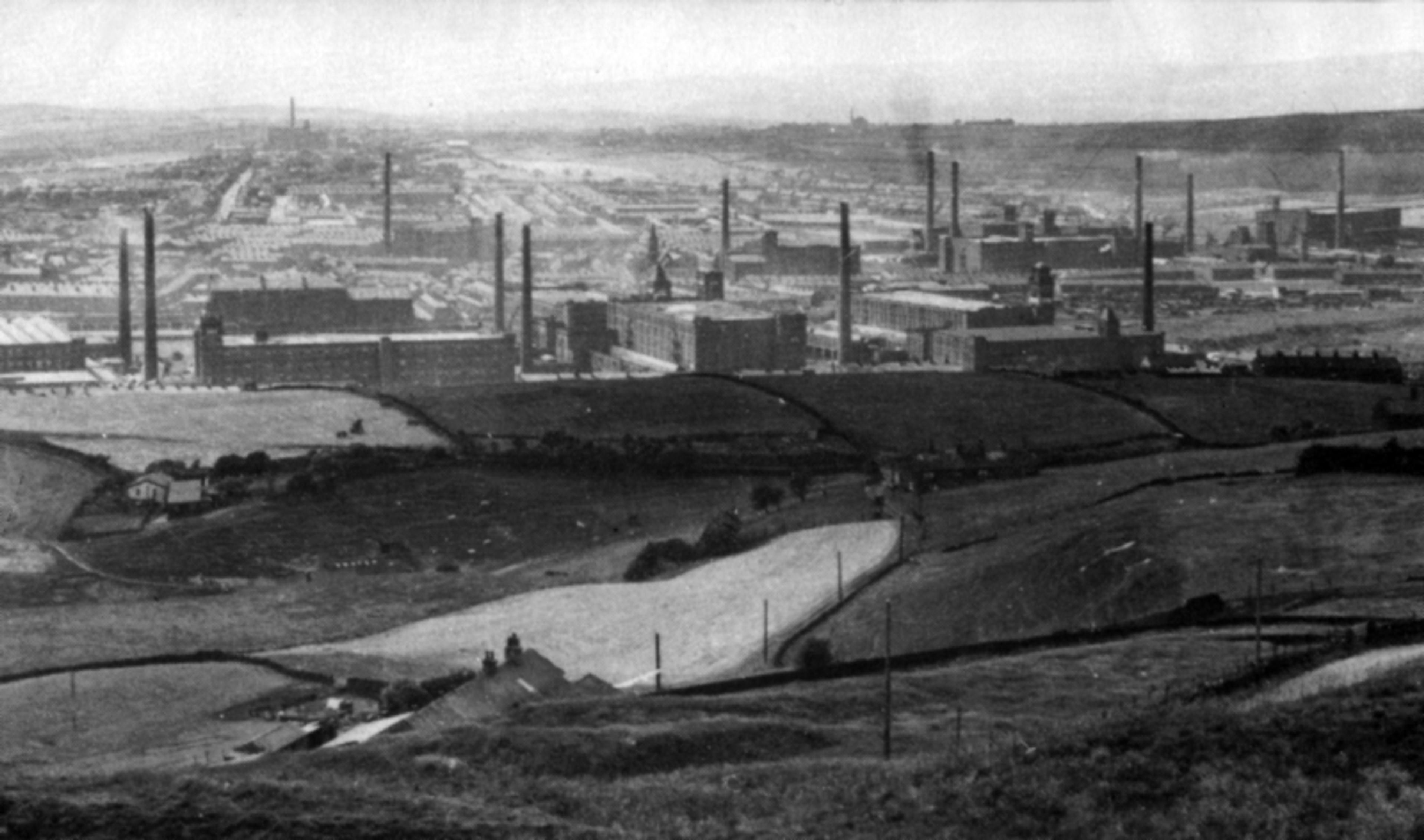
The millscape view of Crompton near Manchester at the height of the Industrial Revolution. Photo courtesy Wikipedia
Since a world market led to the idea of world literature, and European colonialism underlay the world market, wasn’t world literature therefore an extension of colonialism, a rebuke to Goethe? For Marx and Engels, world literature was bourgeois, ie capitalist and therefore imbricated with colonialism. But to reject world literature would be to throw out the baby with the bathwater. Neither globalisation, nor a global interconnected literary world were, themselves, the problem. Everything hinged on the how, on the terms of organisation. Globalisation was inexorable, and a world literature would also, inevitably, develop; the question was what kind. For Marx and Engels, it was important that world literature be put on a new basis, that it be international and emancipatory and cosmopolitan.
In holding on to the idea of world literature, Marx and Engels were also thinking of something closer to home: their own text. In their celebrated preamble, they announced that the Manifesto would ‘be published in the English, French, German, Italian, Flemish and Danish languages’ – the original language, German, was tucked away in the middle. The Manifesto aspired to be a model of world literature.
Against the odds, Marx and Engels succeeded, though it took decades for The Communist Manifesto to be translated into different languages. In the process, its authors contributed a new genre to world literature: from now on, the combination of grand historical narrative and an urgent call to action that characterised The Communist Manifesto would be the hallmarks of many manifestos to come.
Ever since Goethe, Marx and Engels, world literature has rejected nationalism and colonialism in favour of a more just global community. In the second half of the 19th century, the Irish-born critic Hutcheson Macaulay Posnett championed world literature. Posnett developed his ideas of world literature in New Zealand. In Europe, the Hungarian Hugó Meltzl founded a journal dedicated to what he described as the ‘ideal’ of world literature.
In India, Rabindranath Tagore championed the same idealist model of world literature. Honouring the Ramayana and the Mahabharata, the two great Indian epics, Tagore nevertheless exhorted readers to think of literature as a single living organism, an interconnected whole without a centre. Having lived under European colonialism, Tagore saw world literature as a rebuke to colonialism. But he also saw it as a rebuke to those hoping to cherish only South Asian cultural traditions as the alternative. Like Goethe, he rejected both colonialism and nationalism, insisting on an international, interconnected world built on more just terms.
For Tagore, world literature was to play an important role. In 1913, he would become the first non-Western writer to receive the Nobel Prize in literature. But his success also showed how easily world literature could be co-opted by nationalism, its old antagonist. Despite his political ideals, India in 1950 and Bangladesh in 1971 both adopted Tagore poems for their national anthems.
Though ironic, the nationalist appropriation of Tagore resonated with a core mechanism of world literature: translation. India chose ‘Jana Gana Mana’ (1905), a poem Tagore had originally composed in Bengali, and which was then translated into Hindi, though it deliberately contained nouns that were comprehensible in many Indian languages. After partition from Pakistan, Bangladesh used the first 10 lines of ‘Amar Sonar Bangla’, a Bengali song Tagore had written during Bengal’s first partition, in 1905. (Tagore also inspired the national anthem of Sri Lanka.) Around the same time, the newly constituted German nation state enlisted Goethe as the national poet. Clearly, a battle was afoot. While nationalists were able to co-opt world literature, their success only fortified the commitments of world literature advocates.
In the meantime, world literature thrived in the margins of nations and empires. In 1939, the Yiddish poet Melech Ravitch declared that there existed a Yiddish velt-literatur, spread between Warsaw, New York and Moscow. He praised this development as both an ideal to aspire to and as a market-based reality. He also lamented that the market for Yiddish literature was volatile and underdeveloped. (It would take until 1978 for a Yiddish writer to receive the Nobel Prize in literature: Isaac Bashevis Singer.)
The nationalism and fascism that flourished in the 1920s and ’30s were in principle deeply at odds with the idea, and ideals, of world literature. At the same time, the large flows of migration spurred by European fascism and the wars were a boon to world literature. This paradox was perhaps best represented by two German scholars, Leo Spitzer and Erich Auerbach. Both were forced to flee Germany due to their Jewish ancestry; and both found posts in Istanbul, from which they articulated their ideas of world literature. Though trained in Western literature, Spitzer took up Turkish, while Auerbach mostly stuck to what he already knew.
Like 19th-century Paris, the US suffers from the provincialism of the metropole
Auerbach’s main work, Mimesis: The Representation of Reality in Western Literature (1946), is a sweeping narrative, ranging from Homer to Virginia Woolf, headed by an epigraph from Andrew Marvell: ‘Had we but world enough and time …’ What Auerbach lacked even more, however, at least according to his own account, was a good library, hence his omission of scholarly debates and secondary literature (if he had taken up Turkish, he would have had a much better selection at his disposal). Auerbach wrote Mimesis for the survivors of the Second World War, hoping to ‘bring together those who maintained their love to our Western history’. For Auerbach, world literature would help stitch together the torn fabric of Western civilisation.
Emigration to the United States during and after the Second World War, including by Auerbach and Spitzer, made the US a hospitable place for world literature, but brought challenges too. As the US gained cultural prominence in the post-war world, it became a powerful net exporter of its own culture. The trend continues to this day, when only 3 per cent of books published in the US are translations from foreign languages. Like 19th-century Paris, the US suffers from a particular type of provincialism, the provincialism of the metropole.
In 2008, Horace Engdahl, the permanent secretary of the Swedish Academy, which bestows the Nobel Prize, complained: ‘The US is too isolated, too insular. They don’t translate enough and don’t really participate in the big dialogue of literature. That ignorance is restraining.’ But Engdahl got it only half right (he had to step down from his post). Despite the small percentage of translated works in the US, the overall size of the market has actually made it an important place for foreign literature, with smaller presses filling the void left by more reluctant larger publishers. The journal World Literature Today has been championing the cause for decades. New online ventures, such as Words Without Borders, are contributing to the effort.
Elena Ferrante is a recent example of a writer who enjoyed success in her native Italy, but who became a global phenomenon only when her work won critical acclaim and breathtaking sales in the US. Ferrante’s reception in the US even caused a second, much larger wave of interest in Italy. Literary migrants have provided the US with another source of world literature. Some, like the Nigerian writer Chimamanda Ngozi Adichie, write in English. Others, such as the Turkish novelist and Nobel prize laureate Orhan Pamuk, continue to write in their native tongue while using their position in the US to advance their standing as world authors. The Chinese-born writer Ha Jin exemplifies a third group, writers who make the US their home and then switch to writing in English. World literature has thus remained what it had been since Goethe, both an aspiration and a market-based reality.
In the US, world literature took up residence in the booming post-war colleges and universities. There, the expansion of higher education in the wake of the GI Bill helped world literature to find a home in general education courses. In response to this growing market, anthologies of world literature emerged. Some of Goethe’s favourites, such as the Sanskrit play Shakuntala, the Persian poet Hafez and Chinese novels, took pride of place. From the 1950s to the ’90s, world literature courses expanded significantly, as did the canon of works routinely taught in them. World literature anthologies, which began as single volumes, now typically reach some 6,000 pages. The six-volume Norton Anthology of World Literature (3rd ed, 2012), of which I am the general editor, is one of several examples.
In response to the growth of world literature over the past 20 years, an emerging field of world literature research including sourcebooks and companions have created a scholarly canon, beginning with Goethe, Marx and Engels and through to Tagore, Auerbach and beyond. The World Literature Institute at Harvard University, headed by the scholar David Damrosch, spends two out of three summers in other locations. It has more than 150 affiliated members from around the world. My own graduate students work on topics such as how contemporary Chinese authors break into world literature (Yanping Zhang); the literature and art competitions that were part of the Olympic Games until the 1950s (Miles Osgood); and why the Aspen Institute was founded with a tribute to Goethe’s idea of world literature (Janet Zong). Scholars of world literature study the circulation and reception of specific texts, as well as their production, in trends and patterns, from the rise and fall of certain genres to the influence of writing technologies, as well as the interpretive practices that form the core of literary studies.
The Stanford scholar Franco Moretti has pioneered new quantitative methods to study large numbers of texts available, for the first time, in online databases. This kind of quantitative analysis in literature remains in its infancy, but it is clearly significant: quantitative approaches might change the study of literature as profoundly as the quantitative turn in the social sciences changed sociology 100 years ago.
The study of world literature can be understood as a sub-set of world history (see Jeremy Adelman’s recent essay in Aeon). World history is a more established field than world literature, more experienced in synthesising large numbers of national or regional case studies. It has also enjoyed surprising popular success with commodity histories such as Mark Kurlansky’s seafood trilogy: Cod: A Biography of the Fish that Changed the World (1998) and Big Oyster: History of the Half-Shell (2006), seasoned with Salt: A World History (2002). World literature scholarship has yet to produce such popular fare.
And it has its opponents. Some university deans have been unimpressed, and have tried to close down world literature programmes, replacing them with easier distribution requirements. I have heard students complain that they don’t want to read Chinese novels because those novels are likely to be strange, echoing Eckermann, Goethe’s secretary, 200 years ago. Some opponents of world literature come from within the ranks of literary scholars. The quality of translations constitutes one ground of criticism, and not without reason. The English translation of one of the Chinese novels Goethe read, for example, was riddled with mistakes. Even the title was mistranslated. Auerbach himself expressed misgivings about teaching literature without knowledge of its original languages, and others have echoed this concern.
Rather than being an antidote to colonialism, world literature was seen as a form of cultural imperialism
As the study of world literature blossomed in the past 20 years, critics reached for a wider and broader set of arguments. Some, drawing from post-modern theory, rejected world literature as another pernicious attempt to tell a ‘grand narrative’. Questions about the quality of translations developed into opposition to translation as such. In keeping with an old Italian proverb that had punned traduttore traditore (translators are traitors), some of these arguments veered close to older ideals about the purity of individual languages or the singularity of literary works: the tacit assumption was that if you were not a native speaker, or almost as good as one, it was better to stick to your own.
A third group of critics objected to the fact that a market made world literature possible. The comparative literature scholar Gayatri Spivak at Columbia University accused the US of trying to dominate the world by exporting world literature anthologies. Rather than acting as an antidote to colonialism, as envisioned by Goethe and Tagore, world literature found itself accused of being a form of cultural imperialism. The problem with the argument was that the opposite was actually the case. World literature anthologies published in the US weren’t intended for export at all, and publishers therefore didn’t acquire foreign rights because there was no market for world literature anthologies outside the US. World literature was an attempt to import foreign literature to the US, using the market to change ingrained reading habits. World literature anthologies seek to combat nativism as well as the dominance, in many Western countries, of literature from former European colonies, above all England and France.
Already in 1922, Zheng Zhenduo, a Chinese advocate of world literature, had recognised the roots of some of these scholarly objections. He complained that the study of literature was organised according to nation states into national literature departments, and therefore structurally opposed to world literature. Almost 100 years later, the same organisation prevails, which means that world literature is being taught around the edges of national literature departments. This is changing only slowly: Boston University has just renamed its comparative literature department, changing this to the department of world languages and literatures.
Today, with nativism and nationalism surging in the US and elsewhere, world literature is again an urgent and political endeavour. Above all, it represents a rejection of national nativism and colonialism in favour of a more humane and cosmopolitan order, as Goethe and Tagore had envisioned. World literature welcomes globalisation, but without homogenisation, celebrating, along with Ravitch, the small, diasporic literatures such as Yiddish as invaluable cultural resources that persevere in the face of prosecution and forced migration.
There is no denying that world literature is a market, one in which local and national literatures can meet and transform each other. World literature depends, above all, on circulation. This means that it is incompatible with efforts to freeze or codify literature into a set canon of metropolitan centres, or of nation states, or of untranslatable originals. True, the market in world literature is uneven and not always fair. But the solution to this problem is not less circulation, less translation, less world literature. The solution is a more vibrant translation culture, more translations into more languages, and more world literature education.
The free circulation of literature is the best weapon against nationalism and colonialism, whether old or new, because literature, even in translation, gives us unique access to different cultures and the minds of others. Nothing humans have ever done, in all the arts or sciences, can transport and enrich our imagination, our understanding of and empathy for other human beings and their lives, the way literature can. This also means that world literature isn’t always easy. We’re all Eckermann, formed by limited traditions, overwhelmed by the thought of the thousands of Chinese novels out there. But trying is everything.
World literature began as an ideal or aspiration. ‘The era of world literature is at hand, and everyone must contribute to accelerating it,’ Goethe admonished the reluctant Eckermann. Nearly two centuries later, this remains true. World literature isn’t inevitable or automatic. Colonialists, nationalists, enemies of the market, advocates of censorship have all opposed the circulation of literature, and continue to do so. This means that world literature is an achievement that, without active support, can be lost. We don’t have to accept every instance or form of market freedom and growth as good, but world literature is a market that must be sustained – and everyone must contribute to accelerating its growth.
